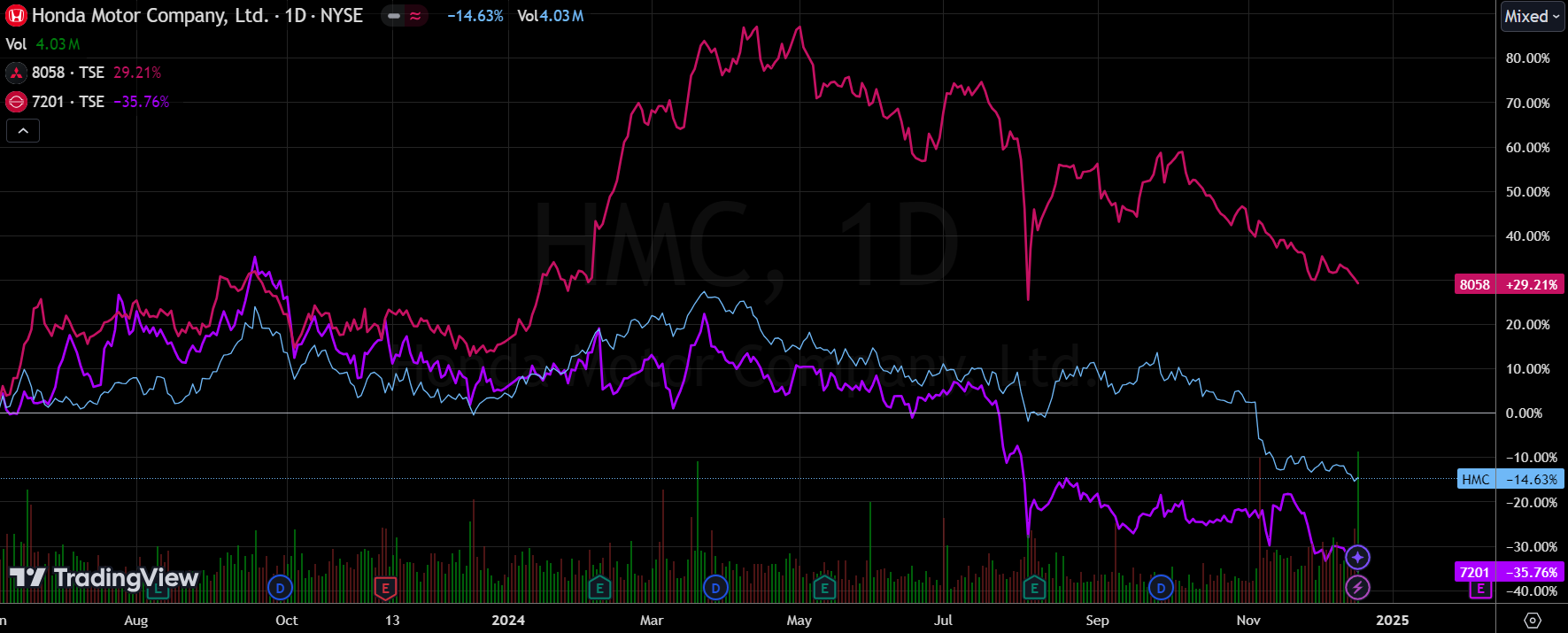$Honda(HMC)$ , $Nissan Motor Co., Ltd.(NSANY)$ and Mitsubishi may engage in merger and reorganization related matters.Honda is considering a variety of options including merger, capital cooperation or the establishment of a holding company.
In fact, the two companies began to explore cooperation in March this year, and in August carried out a comprehensive business cooperation on the generalization of in-vehicle software and components and other consultations, Mitsubishi Motors has also expressed the desire to cooperate.
Merger rumors
According to Nikkei News, Honda and Nissan are preparing to start negotiations on a merger, and plans to eventually bring Mitsubishi into the holding company's fold, Nissan is currently Mitsubishi's largest shareholder, holding a 24% stake.
Rumors triggered capital market volatility, Mitsubishi Motors shares rose to 17%, Nissan bid buy order offer touched the upper limit of intraday trading, Honda shares fell 2%, overnight Nissan shares rose sharply, Honda shares also rose slightly.
Reasons for the merger
Financial distress: Nissan is in a deep financial crisis with only 12 - 14 months of cash reserves left, operating profit has fallen sharply, facing pressure from aggressive shareholders and huge debt, and its credit rating is being questioned; Honda's financial position has declined, it has lowered its earnings and delivery guidance, its net profit has fallen more sharply, its sales volume has fallen short of expectations, and its revenue growth has fallen short of market expectations.
Market Competition: Competition in the global automotive market has intensified, and the transition to electric vehicles will require huge investments, where scale and cost are critical.
Merger Impact
Corporate landscape: If the merger is successful, annual sales are expected to exceed 8 million units, which could challenge Toyota and Volkswagen, spawn Toyota rivals, and consolidate Japan's automotive industry into two camps, allowing Honda and Nissan to gain more resources in competing with their peers.
Model Adjustment: Mitsubishi may eliminate less competitive models if it participates in the merger.
Competitive Landscape: Helps compete with electric vehicle rivals such as Tesla and Chinese carmakers, and is in a better position to compete with Toyota.
There are some who are skeptical about the prospects of the merger.For example, the head of a major Japanese fund argued that the overlapping businesses of the two companies could lead to massive layoffs and write-downs.In addition, it was noted that the negotiations were at an early stage and that there were concerns about opposition from the Japanese political side.
Honda:
Stock price, the U.S. stock closed on December 17, 2024, $ Honda Motor (HMC)$ shares at $ 25.26, up 0.96%.
In terms of sales, terminal automobile sales in China in November 2024 amounted to 76,773 units, a year-on-year decline of 28.02%, while cumulative sales from January to November amounted to 740,399 units, a period-over-period ratio of 69.3%, i.e., a year-on-year decline of 30.70%.
In terms of revenue, in the first half of fiscal year 2024 (April to September), its revenue rose 12.4% year-on-year to 10.7976 trillion yen; operating profit increased 6.6% year-on-year to 742.6 billion yen; operating profit margin fell to 6.9% from 7.2% a year earlier; and pre-tax profit fell 15.6% year-on-year to 741.9 billion yen.
The company had planned to cut its production capacity of fuel cars in China by one-third and close some production lines.
Under pressure from declining sales, its China sales have fallen for 10 straight months since entering 2024.
Nissan (Nissan): $Nissan Motor Co., Ltd.(NSANF)$ $ Nissan Motor (NSANY)$
Shares of Nissan Motor rose sharply at the opening of the December 18, 2024 Japanese stock market.
The company is in a difficult position, facing financial difficulties and reportedly has only 12 to 14 months of cash reserves left.
In the first half of fiscal year 2024 (April to September), the company's net revenue fell 1.3 percent year-on-year to 5.98 trillion yen; operating profit plummeted 90.2 percent year-on-year to 32.908 billion yen, with an operating margin of just 0.5 percent, down from 5.6 percent a year ago; and net income fell 93.5 percent year-on-year to 19.223 billion yen.
In terms of sales, the company sold 1,045,200 units in China in 2022, down 22.1% year-on-year; sales in 2023 continued to plummet by 24% to 793,800 units for the year; in the first ten months of this year, the cumulative sales in China amounted to 558,000 units, a decline of 9.98% year-on-year; and sales in China, including the two business segments of passenger cars and light commercial vehicles, amounted to 63,545 units in November 2024, a decline of 15.5% year-on-year.In November 2024, sales in China, including both passenger cars and light commercial vehicles business segments, totaled 63,545 units, down 15.14% year-on-year, and cumulative sales in China, including both passenger cars and light commercial vehicles business segments, totaled 621,713 units, down 10.53% year-on-year, for the period from January to November.
In November, the company announced that it would cut global production capacity by 20% and initiate layoffs of 9,000 employees, which amounted to nearly 10% of the company's total workforce, making the formulation of consolidation measures a top priority.
As for executives, CEO Makoto Uchida announced that he would voluntarily give up 50% of his monthly salary starting in November, and other members of the Executive Committee would also voluntarily reduce their salaries accordingly.

Comments
With Nissan facing financial strain and Honda's declining sales, a merger could create a powerful rival to Toyota, but there are risks. Could this move make them more competitive against Tesla and Chinese automakers?